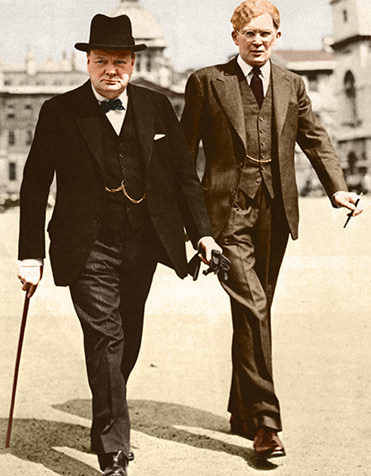Churchill and the Irishman
Published in Issue 5 (September/October 2016), News, Volume 24By Trevor White

Above: Winston Churchill and Brendan Bracken—‘a party of two’. (Little Museum of Dublin)
Everyone knows something about Brendan Bracken—and it’s usually wrong. He was not Winston Churchill’s son, as many people once thought. He was not Australian and he didn’t own the Financial Times, as someone recently claimed. The man himself is partly to blame for all this misinformation. Bracken was an extravagant fibber. He was also, however, a man of substance whose giddy ascent to the top of the pile is chronicled in two biographies, two plays and a new exhibition in the Little Museum of Dublin.
Bracken was born in Templemore in 1901. With his brash personality and seemingly endless reserves of energy, he forged a career as a Conservative MP before the age of 30. During the Second World War he was minister for information in Churchill’s government. (Imagine Walter Mitty in the White House!) He also published the Financial Times and the Economist, among many other titles. Churchill’s son, Randolph, called Bracken the fantasist whose dreams came true.
Prone to bouts of depression, Winston Churchill’s mood was lifted by the exuberant Irishman, who offered unstinting support in the ‘wilderness years’. They were, as Bracken later boasted, ‘a party of two’. One of Bracken’s final acts was to arrange for the old schoolhouse of his Alma Mater, Sedbergh School, to be restored, with an inscription above the doorway: ‘Remember Winston Churchill’. Churchill never once visited the school, which is perhaps indicative of the true nature of the friendship.
One of the curious aspects of the Bracken story is why its subject decided not to tell it. Towards the end of his life, Bracken developed a conviction that his life should be erased from the pages of history. He ordered all his papers to be burned on the day after his death, didn’t want a funeral and was adamant that there wouldn’t be any biography. ‘I shall die young and be forgotten,’ he told friends. The friendship with Churchill (often punctuated by heavy drinking) may explain why Bracken tried to delete all record of himself. Anxious to ensure that his hero’s legacy was not tainted by association with a self-mythologising adventurer, the Irishman withdrew.
Charles Lysaght has a different explanation. He observes that Bracken was a secretive character by nature, and in the early days he seemed ‘to have slightly more money than he should have had’. Bracken’s letters home to his mother are a key piece of evidence in Lysaght’s masterful biography—and in our new exhibition, ‘Churchill and the Irishman’. They constitute the most intimate record of Bracken in his own words. Reflecting on subjects like Churchill, W.B. Yeats, Anglo-Irish relations and Guinness, the letters reveal the inner thoughts of a young man in a hurry. They were purchased at auction by the Little Museum of Dublin under the guidance of Lysaght and Bracken’s nephew, Brendan, who also helped us to curate our exhibition.
In focusing on this subject we are not trying to reclaim Bracken for Ireland. It would be convenient if the great upstart had reconciled himself to the country in which he spent a troubled childhood. That was not the case. Indeed, Bracken had an uneasy relationship with Ireland for the remainder of his life. He opposed the hand-over of the Treaty Ports before the Second World War, opposed the return of the Lane pictures and resented Irish neutrality during the war.
Brendan Bracken has long been an awkward presence in Anglo-Irish history. There are still people who call him a traitor to the country of his birth. (His father, J.K. Bracken, was a member of the IRB and one of the founders of the GAA in 1884; the GAA club in Templemore still bears his name.) An introverted showman, the twists and turns of his life are certainly an affront to anyone with a narrow view of Irishness. Ultimately, however, the acrobatic Bracken enhances our understanding of the complex shared history of these islands.
The most influential Irishman in the Second World War was a fantastic self-construction whose relationship with Winston Churchill was more important than many people assume. But the life of Brendan Bracken is also worth remembering in its own right. This extraordinary story deserves to be shared with a new generation of global adventurers.
Trevor White is director of the Little Museum of Dublin. ‘Churchill and the Irishman’ runs at the museum until 28 September 2016.
















